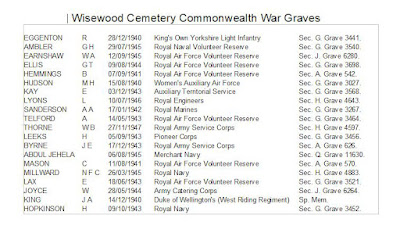When preparing my walk to look at the geology of Stannington Ruffs and to photograph various listed buildings in the Loxley Valley, I also prepared a list of 17 Commonwealth War Graves Commission (CWGC) headstones that can be found in Wisewood Cemetery.
As I had discovered at the extensive Burngreave, Abbey Lane and Crookes cemeteries, even with the benefit of the plot numbers and a cemetery plan, it can be very difficult to locate individual graves but, on this occasion, I found every one on my list.
Since first encountering my first CWGC headstone, at the Church of St. John the Baptist in Dronfield, I developed an interest in photographing the fine details of these, especially the shallow relief sculpture used for the regimental crests.
I immediately found the Portland stone headstone of Private J.A. King of the Duke of Wellington’s (West Riding Regiment), which I had not encountered before. This is a Special Memorial, which is used when the casualty’s original site of burial cannot be located and it is deliberately located away from the other regularly placed plots.
The detailing of the crest is very sharp, which suggests that it is a modern replacement headstone that has been cut with a CNC machine using Alphacam software - a process that takes about 30 minutes. It contrasts markedly with the original hand cut Portland stone headstone of Fireman A. Jehela of the Merchant Navy, which was certified complete on 18th December 1957 and the fine details are no longer easily seen.
He served on S.S. Fort Battle River, which was sunk by the German submarine U-410 on 6th March 1943 but without loss of life. It is of further interest for the use of what the memorial mason’s works schedule describes as a Mohammedan emblem and its personal inscription - ALWAYS SMILING ALWAYS CONTENT LOVED AND RESPECTED WHEREVER HE WENT.
The remaining 15 headstones exhibit crests of the Royal Air Force, the Royal Navy and several regiments that I had seen a few times before and all but two, which are Italian Botticino marble, are made with Portland stone.
The Graves Registration Report Form for all 17 original Portland stone headstones is the 18th December 1957 and it is interesting to see how this stone has performed in the years since, especially because they would not have been greatly affected by the sulphurous pollution from Sheffield's steel industry, which is located in the Lower Don Valley some 6 km to the east.
According to the CWGC website, the Botticino marble headstones of Marine A.A. Sanderson of the Royal Marines and Private H. Leeks of the Pioneer Corps were erected in February 1981. The headstones of Private W. Joyce of the Army Catering Corps and Aircraftmen A. Telford of the Royal Force have been renewed in Portland stone, which again look like they have been cut with a CNC machine but, as with J.A. King, there is no record of when they were made.
Looking through the CWCG website, a recent Blog post states that 30 different types of stone have been used for the headstones, without going into detail, and another less reliable source states that Portland stone is no longer used and that only Botticino marble – actually a limestone and not a true marble – is used instead.
As a geologist with specialist interests and skills in stone identification and matching - learned in the building restoration industry in London – I am aware that various organisations such as the Sheffield U3A Geology Group and the Friends of Moorgate Cemetery in Rotherham use such places for their events and I therefore kept my eyes open for anything that might be of interest.












No comments:
Post a Comment